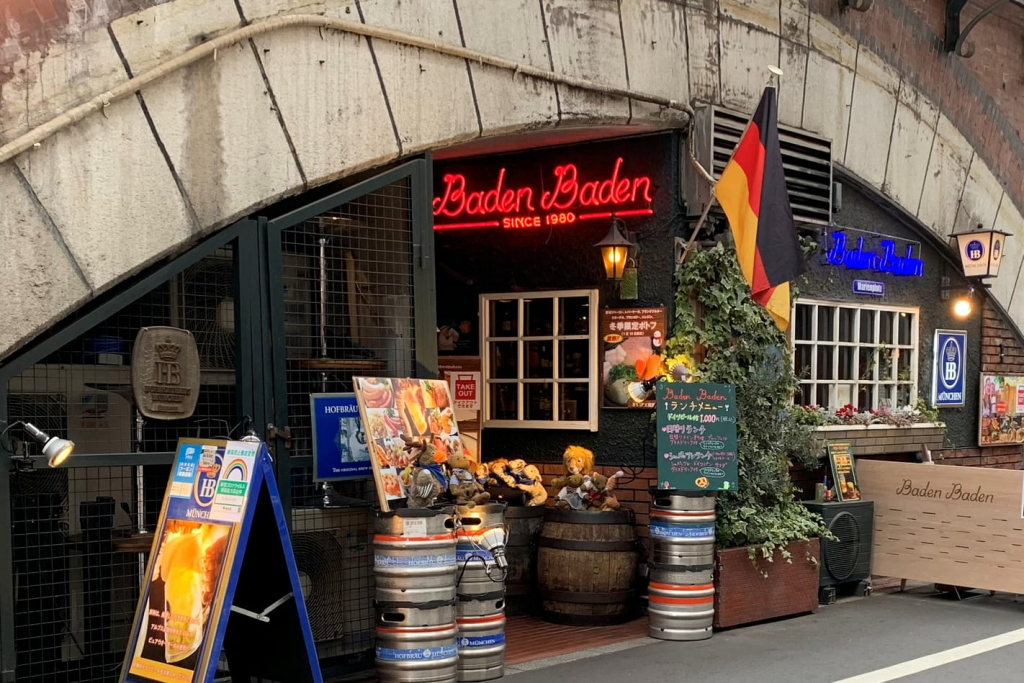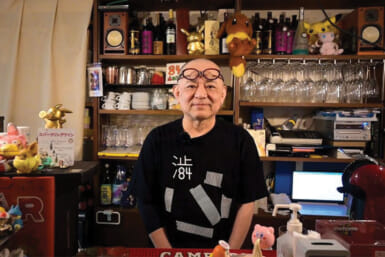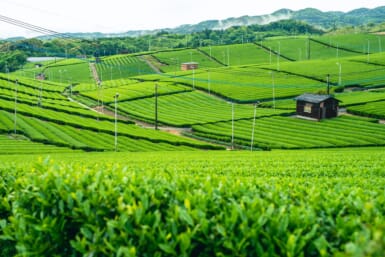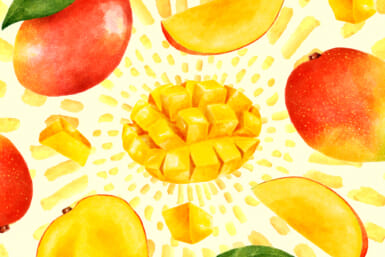With its unbeaten collection of Michelin stars, Tokyo is often considered the world’s gourmet capital. It’s safe to say that the city’s German restaurant scene doesn’t figure much into this evaluation. And yet, Germans and German food sympathizers need not despair. Several eateries serve authentic German dishes or at least interesting variations and you can find a growing number of specialty shops selling meat, bread, wine and other groceries for home consumption (almost) like the ones you might find in Bremen or Munich.

Schmatz
Schmatz: The Sound of Kissing and Eating
The easiest and most accessible way to enjoy German cuisine in and around Tokyo is Schmatz. In German, it’s an onomatopoeic expression for the sound your lips make when passionately munching on something (or kissing somebody). In Japan, it’s the name of a chain of restaurants and beer stands found at ever more locations in Tokyo and neighboring prefectures. The Schmatz logo has become such a common sight in more or less urban areas that it is often assumed to be a Japanese operation only pretending to be German. Rest assured, Schmatz is the real deal.
It was founded by two childhood friends from Hamburg, who started with nothing but a food truck in 2014. Today, they operate several restaurants and brew their own beer, from German standards to more modern, crafty fare. All their creations are highly drinkable and go well with the food, which might be described as “quality fast food” and only occasionally materializes as Japanized, “German-inspired” dishes. The fried Leberkäse (a meatloaf containing neither liver nor cheese, although its name translates to “liver cheese”) on a stick with gorgonzola sauce usually makes actual Germans laugh though.
Arguments about where to find the best Currywurst can become quite heated among Germans and regularly cause friendships to break. I will admit I have yet to find a better one in Japan than the one at Schmatz.
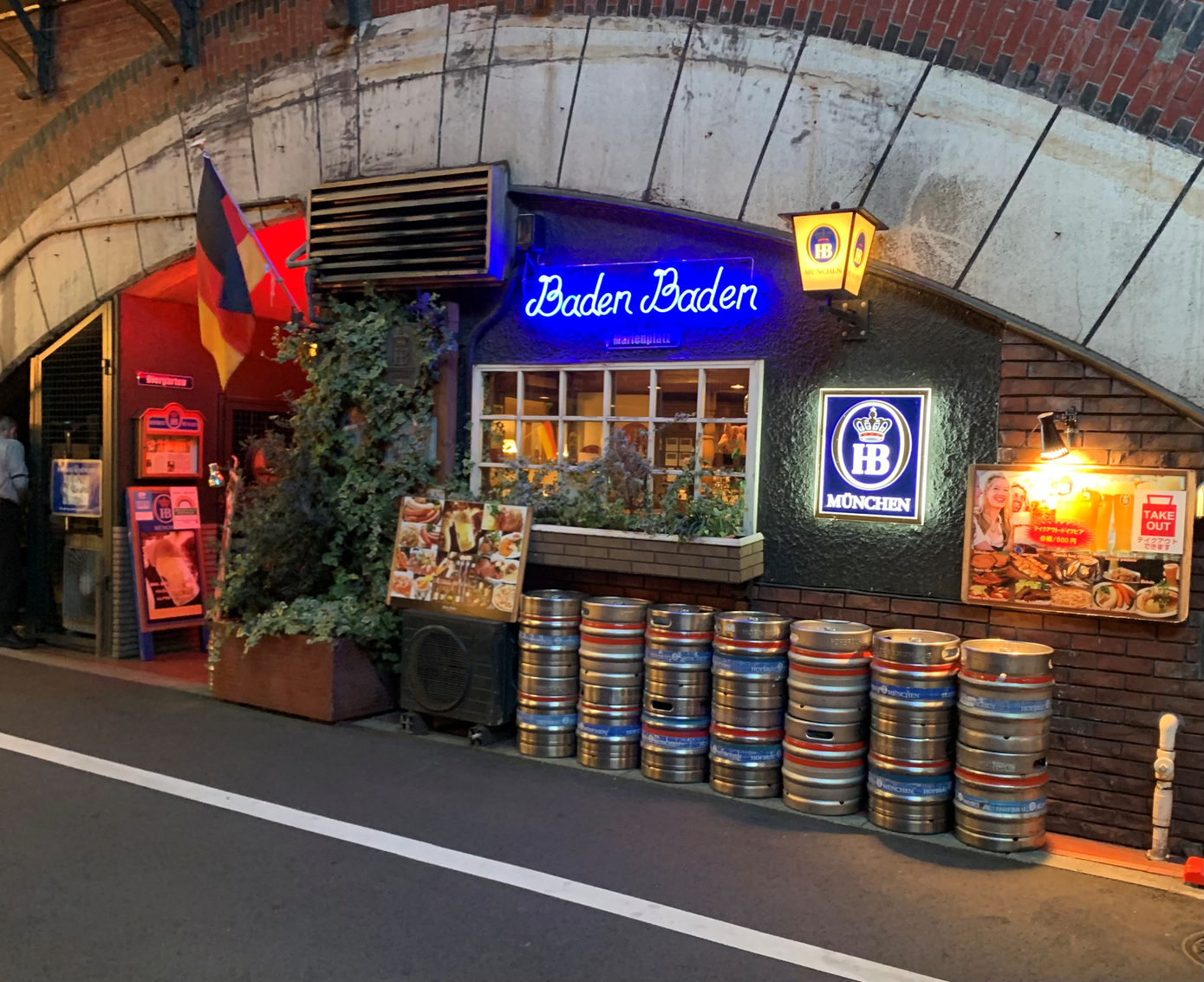
Baden Baden
Baden-Baden: Where the Music Plays, for Better or Wurst
What Schmatz has been doing since 2014, Baden-Baden has been at since 1980. Mainly serving casual and mostly southern German cuisine, although there are some more fanciful and some northern options available, such as Matjes (pickled herring). In a relatively large space underneath the tracks of the Yamanote Line near Ginza (this famous stretch of restaurants also has some other German pubs and eateries), Baden-Baden’s atmosphere ranges somewhere between German beer tent and Japanese izakaya.
While the vast selection of sausages can be hit-and-miss, the schnitzel is recommended. Baden-Baden doesn’t have its own range of beer but carries a fine selection of German standards on tap and some lesser-known creations from the bottle. Here you will also get a chance to hear the authentic, brass-heavy mood music often associated with beerhall shenanigans (for comparison, Schmatz mostly seems to play international disco hits from the 1970s).
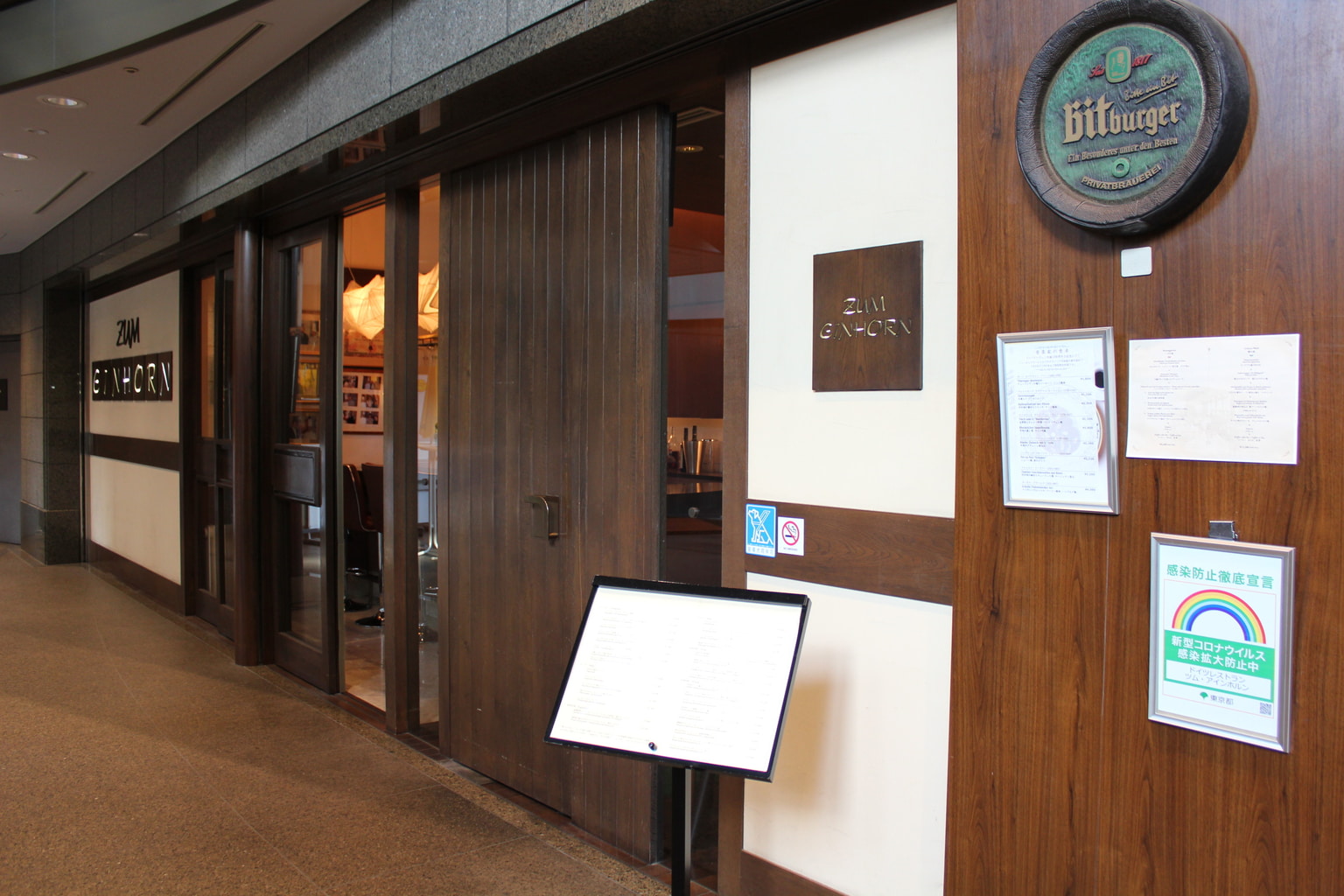
Zum Einhorn
Zum Einhorn: Going Beyond Sausage
At Roppongi’s Zum Einhorn, owner and chef Hiroshi Noda deliberately looks beyond sausage. In fact, there is hardly any of it on his menu. Instead, there are lots of fish dishes, as well as cuts of lamb, duck and deer, seasonal specialties (honoring, for instance, the all-important “Spargelzeit” or asparagus season), and even some vegetarian options (not entirely unheard of in Germany).
I grew up in the fishy north, but I spent a considerable chunk of my life in the meaty south. I learned to enjoy both approaches, also going through a semi-strict vegetarian phase in between. At Zum Einhorn, I can relive all these stages of my culinary education, with a good glass of German wine. And that’s a true rarity in Japan. I love beer (this cliché about us Germans seems to be true), but by and large Japanese beer is at least as good as German. What I do miss dearly is the wine. Proper, non-sweet, non-hot German wine. Yes, it exists, and Zum Einhorn is one of the few places to sample it here, an appropriate budget provided.

Ginza Lion beer hall
Beer Halls: Kirin City and Ginza Lion
Beer was once brought to Japan by the Dutch, but the Japanese learned to perfect it by following German procedure. While at it, they also adopted German beer hall culture, opening several chains of brewery-owned casual restaurants like Kirin City and Ginza Lion. The original Ginza Lion Beerhall, opened in 1934, is the oldest in Japan. Its interior of red bricks and colorful mosaic survived the area’s bombings in WWII and it is now a Registered Tangible Cultural Property of Japan by the Agency of Cultural Affairs (even though it mimics German architecture).
In beer halls, you will find the usual selection of potatoes and sausages, but the food isn’t the main reason to visit. The Ginza Lion chain is operated by the Sapporo brewery, which means at least the beer is good. In fact, they serve several creations you can only find there, which almost makes it worth going. Or at least bearable if you find yourself in one of these beer halls.
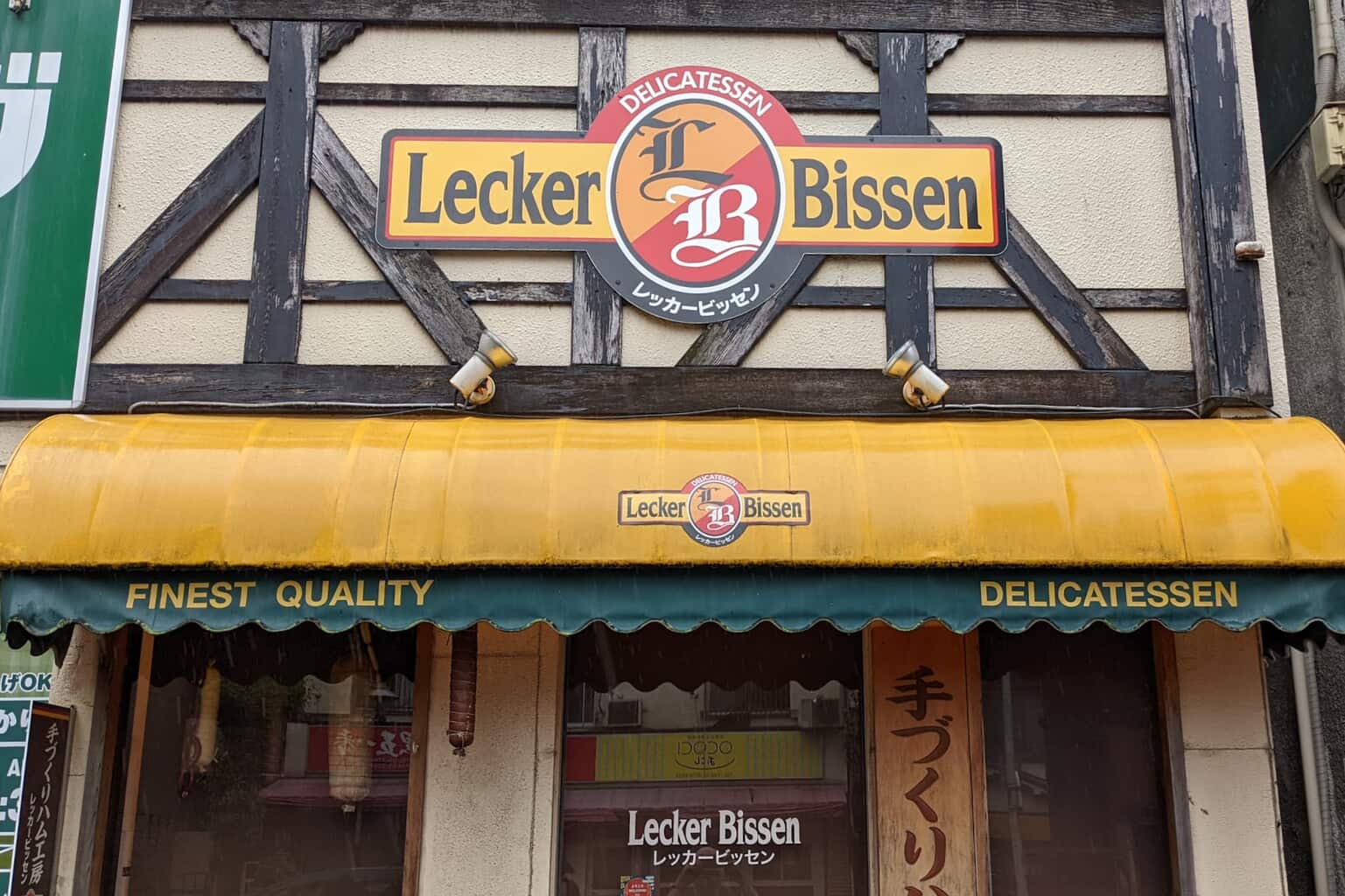
Lecker-Bissen
Eat In: German Groceries and Where to Find Them in Tokyo
Besides good German wine, one of the hardest things to come by in Japan is good German bread (or just good bread). Tokyo bakeries like Tanne and Linde are worth the trip and the area around Ookayama station seems to be a bit of a German bread hotspot, housing both the original Himmel shop and the highly recommendable organic bakery Schomaker.
Lecker-Bissen (a cute expression meaning delicacy, originally not hyphenated) started as a small meat shop in Meguro and can now be found in several locations. Their products have considerably improved over the years and they also sell a small selection of non-meat items, such as beer and mustard. Schmankerl Stube, currently located at Futako-Tamagawa’s Rise shopping center follows a similar concept.
International supermarkets National Azabu and Nissin World Delicatessen offer, among other things, decent slices of Leberkäse (not on a stick and without gorgonzola sauce) as well as the sweet or hot mustard to go with it. The latter’s excellent wine section is also one of the few places in Tokyo to find a selection of acceptably dry Rieslings to take home at somewhat acceptable prices.
If you are in Yokohama, check the Kaminagaya area for more German delicacies.
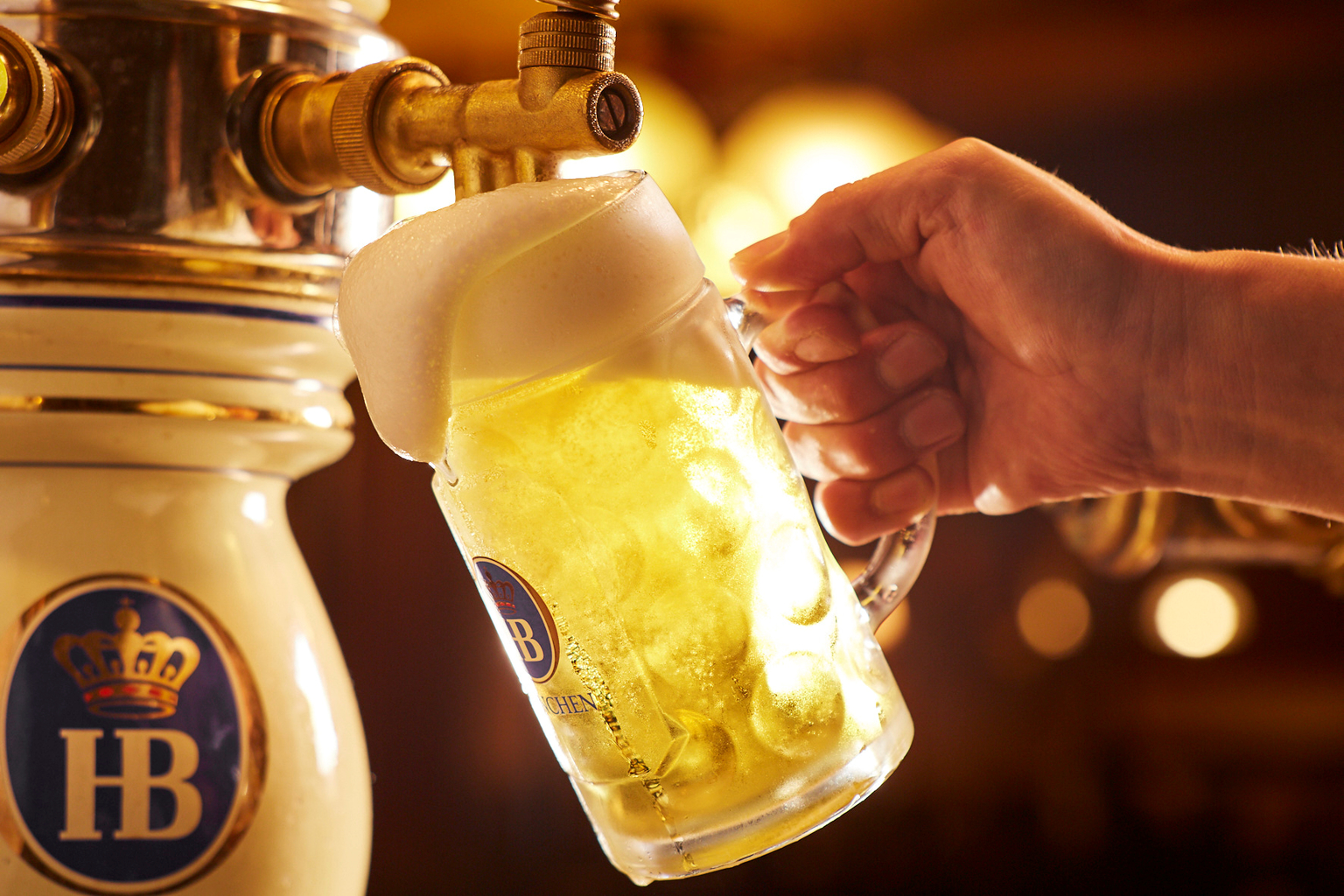
Final Thoughts
Let’s end with an existential question: What is a German restaurant? Any Chinese person will tell you that there is no such thing as a designated “Chinese restaurant” in China (unless it’s a tourist trap). Regional cuisines are wildly different and can rarely be found under one roof. The same can be said about “German restaurants” in Germany. Or any cuisine tied to a country.
In Japan, however, we will cut them some slack for wildly mixing dishes from the north, south and everything in between. At Schmatz and Baden-Baden, it is done mostly casually, with a strong southern focus. Roppongi’s Zum Einhorn does it fancifully and more diversely.
For a good itinerary through the German restaurants in Tokyo, you can follow in my footsteps. When I was courting my then-girlfriend, I took her to Baden-Baden for a fun, casual, yet not too shabby night out. When the relationship got more serious and announcements had to be made, I took her and her parents to Zum Einhorn. Now that we have a seven-year-old daughter, we mostly dine at Schmatz whenever we feel that German craving.

